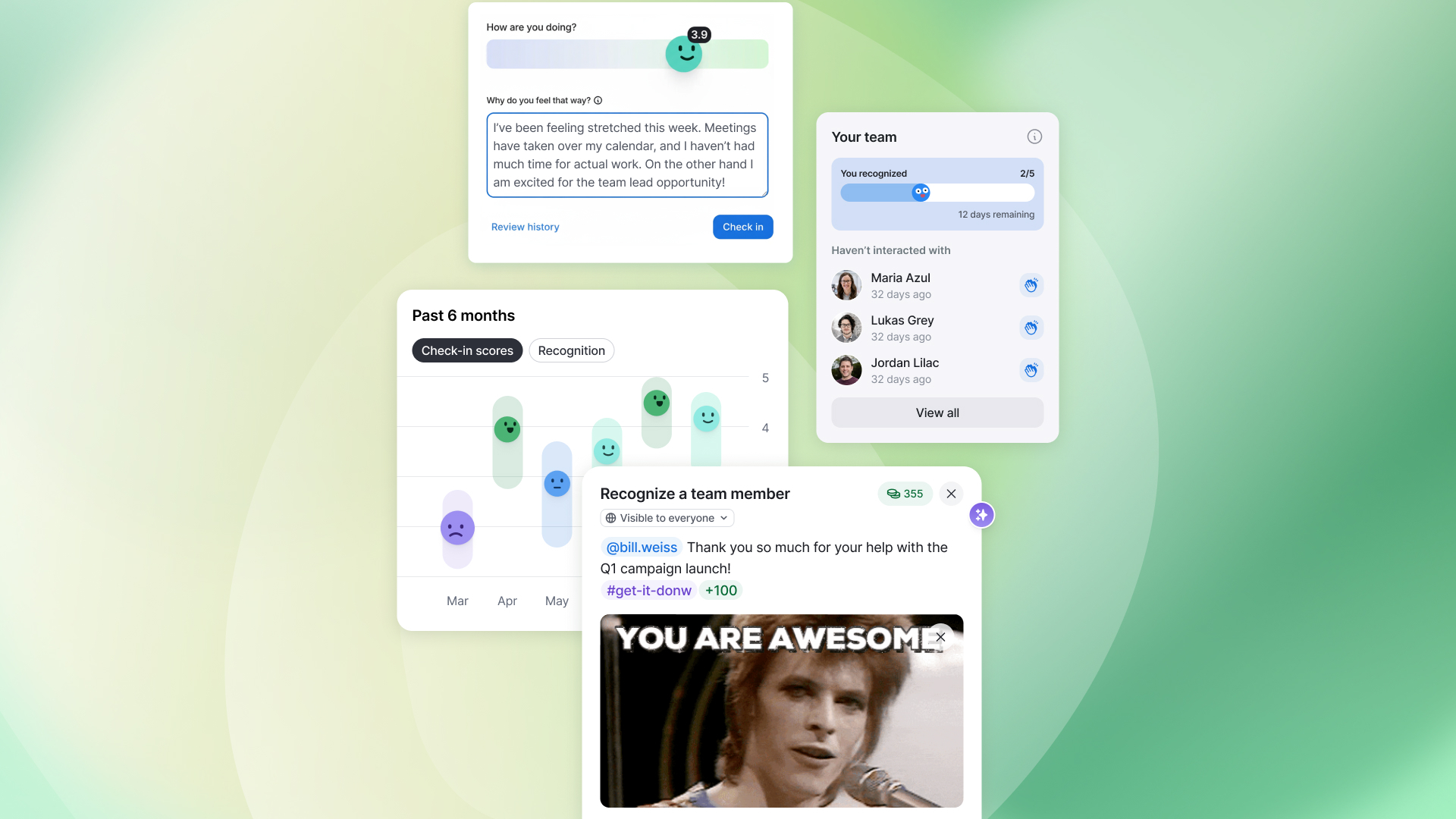5 Ways Emotional Intelligence Makes You a Better Leader

Leading and managing a team isn't easy, but some make it harder on themselves by ignoring a few basic principles of emotional intelligence.
You don't need to be an expert or focus an extraordinary amount of effort on emotional intelligence (also referred to as EQ) for you and your team to experience the benefits. By following a few basic principles, you can improve your emotional intelligence, and as a result, improve many things, from employee experience to organizational performance. 💚
How does that work?
IQ and technical skills are important for nearly any business application, but they're only the table stakes that get you into the game. In his seminal Harvard Business Review article, "What Makes a Leader?", Daniel Goleman explains:
It’s not that IQ and technical skills are irrelevant. They do matter, but…they are the entry-level requirements for executive positions.
A leader who excels in emotional intelligence will often be more effective because they already have the primary skill sets that the job requires. In addition to that, they possess a deeper understanding of themselves, their team, and how their thoughts and actions impact success.
Want our newest blog posts straight in your inbox? Sign up for our bi-weekly newsletter!
Emotional intelligence qualities for managers and leaders
Here are five basic traits leaders with stronger emotional intelligence have, and how they improve leadership and benefit the team as a whole:
1. Self-awareness

Self-awareness is described as "the ability to recognize and understand personal moods and emotions and drives, as well as their effect on others."
Why is that so important?
This may seem overly simplified, but self-awareness is the foundation of emotional intelligence. In a nutshell, it's about establishing a more accurate internal barometer—one that is aligned and harmonious with the world around you.
If you've ever worked for someone who flies off the handle at the slightest provocation, you know how those outbursts impacted morale and motivation.
Here's the problem:
This person probably didn't realize they were acting in a way that was counterproductive. Without self-awareness, it's difficult to recognize there might be an issue in the first place. Not many people think, I'm flying off the handle, right now and that's a really smart, effective way to get things done. If they do, they're most likely lacking in empathy, which is another crucial element of EQ.
In most cases, that feedback loop of self-reflection simply isn't happening.
Most people respect a leader who, when challenged with adversity, stays calm and collected—someone who still treats their colleagues with respect no matter what calamity they're facing. They know the consequences of their outward reactions and are aware of their impact on others.
2. Self-regulation

It's crucial, but not enough in itself just to understand. Self-awareness is just the first step. The next step is carrying this understanding into a practice of self-regulation.
Self-regulation is all about your commitment to personal accountability. It's useful to think of accountability in this context: not as something you must hold yourself to, but something to embrace.
Let's illustrate this point:
One leader, looking at this commitment to personal accountability as something they must be held to might think, I need to avoid yelling at my staff because they can't handle it when I do. I'm not going to allow myself to act like that.
Now, this is still miles better than acting without any consideration for the impact it will have on others, but consider an approach where the leader embraces personal accountability: I have the unique ability to make a huge impact on my staff, and I'm excited to make that impact as positive and valuable as possible.
3. Internal motivation

This brings us to internal motivation, or as Goleman describes it, "a passion for work that goes beyond money and status."
Leaders with strong emotional intelligence understand their internal motivations, and how those motivations correlate with those of their team and the organization.
Strong intrinsic motivation is a competitive advantage in almost any business context, and the ability to harness that motivation toward success can't be underestimated.
A highly motivated leader knows the prerequisites to fulfill those motivations, and the important role others play in those achievements. That knowledge helps them make constructive decisions in their interactions and relationships with others.
4. Empathy

Empathy is the ability for someone to understand and share the feelings of another person — to put themselves into the shoes of others, so to speak. It's a key component of successful human relationships and the cornerstone of emotional intelligence.
Why is it so important?
Without empathy, it's difficult or impossible to reflect on the impacts your actions might have on others. If you don't know or reflect on how others might perceive your actions, you can't self-regulate effectively either.
An empathetic leader knows when they're asking for too much.
Empathy also helps a leader to understand the unique circumstances others are facing, and how those circumstances impact their work. In sum, empathy directly affects the employee experience. As Tracy Brower notes in Forbes:
You always knew demonstrating empathy is positive for people, but new research demonstrates its importance for everything from innovation to retention. Great leadership requires a fine mix of all kinds of skills to create the conditions for engagement, happiness and performance, and empathy tops the list of what leaders must get right.
5. Social skills

Finally, advanced social skills are priceless assets to have at your disposal as a leader. These are the tools that are necessary to put all the knowledge, insights, and empathy you're carefully cultivating into practice.
Social skills help you deal with challenging situations and develop mutually beneficial interpersonal relationships. They're the key to navigating awkward situations, resolving conflicts, and strengthening communication.
The MindTools team put together a great guide to emotional intelligence and leadership. In their section on social skills, they mention the ability to effectively give praise as a social skill to prioritize.
Although this is absolutely true, you can take it a step further and work to develop an organizational environment where giving effective praise is a natural and frequent interaction.
As a leader, part of your quest to develop emotional intelligence should include helping others on your team to do the same.
The takeaway
The level of emotional intelligence you're able to cultivate has an extraordinary and immediate impact on the people around you, and in many cases, on the trajectory of your career.
Some believe that EQ level is more predictive of success than a person's IQ. If you haven't read Daniel Goleman's bestselling book on this topic, it's a great resource for any leader. Officevibe's Jacob Shriar also wrote a great article on this topic if you'd like to explore it further.
The five EQ traits are valuable to develop on their own, but they work best in concert. Leaders who exhibit all of these traits often find the greatest success.
Are you ready to take the next step toward stronger work culture and better workdays? Check out our latest guide:







